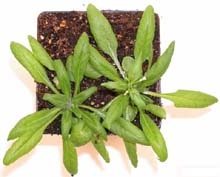GRANT ESTABLISHES METABOLOMICS RESEARCH LAB
A $1 million grant from the W.M. Keck Foundation,
Los Angeles, will help establish a laboratory for research in the new area of
metabolomics in the Plant Sciences Institute at Iowa State
University.

A $1 million grant from the W.M. Keck Foundation, Los Angeles, will help establish a laboratory for research in the new area of metabolomics in the Plant Sciences Institute at Iowa State University.
--------------
Metabolomics research in plant and crop species holds the promise of improving food production technologies, reducing the environmental impact of agricultural practices and advancing the development of biorenewable, environmentally safe sources of industrial chemicals.
------------
To identify the detailed physiological functions of the genes that comprise the entire genetic blueprint of an organism, the contribution of each gene of a genome must be determined at all potential levels of expression--mRNA, protein and metabolite.
-------------
"Iowa State's existing laboratories allow scientists to profile genome-wide expression at the mRNA and protein levels, " Nikolau said. "The new Metabolomics Research Laboratory will enable profiling at the metabolite level, giving us the ability to functionally analyze the operation of the entire genome at multiple levels."
------------
The Metabolomics Research Laboratory will bring together three groups of Iowa State researchers: chemists with expertise in micro-chemical analysis, engineers with expertise in the development of microelectromechanical systems (MEMS) devices, and plant biologists with expertise in functional genomics of plant metabolism.
"The chemists and engineers will develop enabling technologies that will be used by the plant biologists in functional genomics research," Nikolau said. "Initially, 17 faculty from eight departments will use the laboratory and collaborate on interdisciplinary research."
It's something special to watch scientists involved in research so "basic" they need to build their own equipment.
“...we're building a special, high-resolution mass spectrometer," Yeung said, "because there's nothing available commercially that meets our needs.
------------
Once the equipment is ready, the team will look at the chemical content in the cells of Arabidopsis thaliana, a small flowering plant that is widely used as a model organism in plant biology. Arabidopsis is a member of the mustard (Brassicaceae) family, which includes cultivated species such as cabbage and radish.
"Arabidopsis is not a major crop like corn and soybeans," Yeung said, "but because so much is already known about it genetically, we can hopefully begin to draw correlations between the chemical and genetic makeup. We hope that such fundamental research will be applicable to other plants as well."
Posted: Thu - September 15, 2005 at 07:47 AM